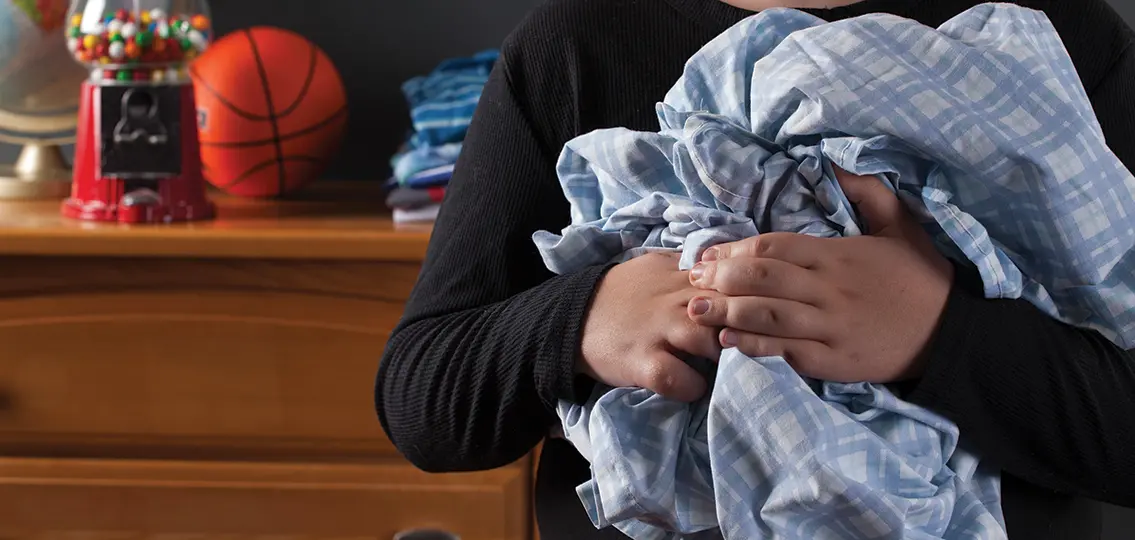Bedwetting, or nocturnal enuresis, is a recurrent problem for about one in 50 tweens and teens in the United States. Many parents believe it’s an issue their older child will eventually outgrow on their own—but the truth is it’s a medical condition that may well persist if not treated. We spoke with Dr. Steve J. Hodges, M.D., Associate Professor of Pediatric Urology at Wake Forest University Medical Center, and his advice may surprise you.

Q: Is bedwetting a problem for tweens and teens?
Hodges: Statistics tell us that about 25% of 5-year-olds wet the bed, with a dropoff of 15% per year after that. By age 12 and older, it’s down to about 2%, which means almost 1 million tweens and teens still wet the bed, some every night. Parents may believe bedwetting happens because their child is a heavy sleeper, or has a small or underdeveloped bladder. Or they may think their kid is dealing with stress or anxiety, or is just lazy and doesn’t want to get up at night. But none of those explanations hold up.
Doctors may try to reassure parents that their child won’t go to college still wetting the bed. But you can’t make that assumption, either. I have patients who were never properly treated and have had to defer college or live at home instead of a dorm because of worries of college bedwetting. Bedwetting in teens should be aggressively treated. It’s a medical problem that can be resolved.
Q: So what causes kids to wet the bed?
Hodges: Nocturnal enuresis in teenagers is almost always caused by chronic constipation, which is defined as the incomplete emptying of the rectum. Kids who have functional constipation—constipation not caused by a congenital abnormality or disease—may feel okay, but they are not completely emptying their bowels when they poop. Even children who poop every single day can be constipated; they just don’t fully empty. After allergies, constipation is the most common medical condition for which kids in the United States are treated.
Q: What other conditions can cause nighttime bedwetting?
Hodges: Certain neurological or urinary tract abnormalities can cause bedwetting, but those are very, very rare. For an otherwise healthy child, there is never an acceptable amount of bedwetting. It’s an unheard-of condition in healthy adults, and after initial potty training and about age 4, enuresis should be considered the same as it would be in adults—as a medical problem. Don’t listen to advice that your child will outgrow it. This embarrassing and stressful condition is completely treatable.
Q: How does constipation happen, and why does it cause bedwetting?
Hodges: Some kids may have a genetic propensity to be constipated, but it doesn’t necessarily affect the bladder in all kids. For many children, it’s pretty simple how it starts: They may experience pain having a bowel movement or a change in stool consistency because of a poor diet—processed food, low fiber, low produce—or illness. They may withhold pooping because they don’t want it to hurt. Or they may not want to use public restrooms, or school bathroom policies may interfere with the urge to defecate when it first occurs. Most animals just go—humans are the only ones who think about it. Most of my patients do not poop regularly at school. They wait until they get home, or when they have privacy.
When children delay pooping, stool piles up and stretches the rectum, which then puts pressure on the bladder and irritates its nerves. That irritated bladder will then empty without warning. It’s a neurological response. It’s as if the nerves surrounding the bladder “hiccup,” causing the bladder to release urine.
Q: If your tween or teen is wetting the bed, what should parents do?
Hodges: First, if you’re looking for teenage bedwetting solutions, go see a doctor for a physical checkup. But don’t stop there if you get the “they’ll grow out of it” advice. If they haven’t grown out of it by this point, there’s a good chance it will persist unless treated aggressively. If parents are skeptical the child is constipated, I usually take an X-ray of a child’s abdomen. The X-ray will almost always show a mass of stool in the rectum, and often you can see the enlarged rectum squishing, or even flattening, the bladder. I measure the rectal diameter; a normal rectum measures about 3 cm or less; most of my enuresis patients have a measurement of 6 to 9 cm.
After family members see the X-ray, they understand exactly what’s going on. I then advise my patients to start a bowel cleansing regimen that varies somewhere between daily doses of Miralax to daily enemas. Usually Miralax isn’t enough, because fresher, soft stool just oozes around the hardened mass. Only when the rectum is cleared daily for many months can it return to its normal size and shape and stop aggravating the bladder. After treating the constipation, most patients see an 80% improvement of enuresis within three months. And most teens are pretty eager to find a solution, so they can go to sleepovers, campouts, and vacation without worrying.
Q: How often should a child have a bowel movement?
Hodges: If you’re eating every day, you should be pooping every day, and it should be a pile of mush. Extra-large, formed stools—like giant logs—are red flags for constipation. Also, it should not take a long time to poop. For most mammals, it takes only 12 seconds to poop.

Q: What should parents tell a child who may be embarrassed and reluctant to get help?
Hodges: Parents should tell their kids it’s not your fault, and it’s treatable. Don’t blame kids. For parents and kids who need support and more information, I have a website, bedwettingandaccidents.com, which offers more information, a treatment protocol, as well as a private Facebook support group.




